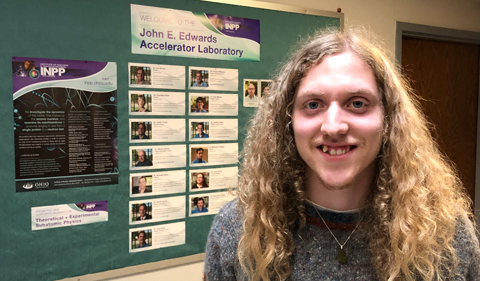By Kevin Boyd
(B.S. Physics Astrophysics, College of Arts & Sciences, Class of 2020)
Experiment E12-06-114 at Jefferson Lab measured the probability of an electron inducing the radiation of a photon by a proton in kinematic regimes previously unexplored. The measurement was performed in 9 different settings. The goal of the experiment was to investigate the internal structure of the proton. Kevin checked the quality of the selection of detected electron for each of these 9 settings.
During my summer internship with physics professor Dr. Julie Roche at Ohio University’s Edwards Accelerator Laboratory, I worked on constructing a program that performed a variety of tasks with respect to the data received from DVCS (Deeply Virtual Compton Scattering) events. Most importantly, the program executed a filtering process for a set of necessary conditions that determined whether detected particles were appropriate for further analysis. The result of running the program for a specified set of experimental data is the plotting of multiple histograms that display the formatted data from multiple stages within the experimental apparatus (the High-Resolution Spectrometer in Hall A of Jefferson Laboratory).
Going into the internship, I had little to no programming experience. Thus, my task of creating an advanced program that utilized experimental data was difficult due to my inexperience with programming. However, with the guidance and direction of Dr. Roche and physics graduate student Bishnu Karki, I was able to make a satisfactory contribution that still proves useful to the Roche research group. By the end of the internship, I had acquired valuable knowledge concerning not only the practice of programming and its relevance in physics research, but more importantly, the art of being a professional in the field of physics.
The most important and practical skill I acquired was the ability to program by learning the various elements associated with the task. There is a logical structure to be learned (syntax, writing a function, etc.) in order to engage with the process. I started my assignment with no prior understanding of this structure, so what I learned primarily was first the terms of programming (macros, functions, etc.), then syntax, and then the process of writing a program using the rules of the C++ programming language.
The main challenge during the summer was the testing of my willpower. I wanted to prove to myself that I could learn all of these skills and concepts from scratch, and at the same time, I wanted to make a sizable contribution and to have something tangible to show for my work. In addition, I did not want to disappoint my mentors who worked so diligently with me while I was struggling with learning to program and writing a program all at once. Learning to program was a huge challenge, and this is to be expected, but retaining my willpower to push through and overcome the roadblocks I faced was the largest challenge of all. I would say I succeeded on this front, and it has provided many valuable lessons considering that the same sort of challenges are present when pushing through the immensely dense and complicated concepts in the realm of physics knowledge.
The physics of the experiment was truly fascinating. Lessons from QFT (Quantum Field Theory) were most prevalent in the physical concepts that governed the phenomena observed in the experiment. What is most remarkable about these ideas is that they remain so far removed from our everyday experience, and even any conceivable imagination, but they still embark our intellect upon a journey of wonder and awe. The mathematics is so harmonious in its descriptions of gauge fields and more, while the physics is extraordinarily intuitive with its inclusion of virtual particles and field excitations.
As a physicist-in-training, there is nothing more exciting than to see a model so elegant, simple, and accessible that describes quantum mechanical phenomena to high precision and accuracy. I have not begun to even scratch the surface of what is to be learned in this new and complicated physics, but what I do know passionately drives me to acquire the proper skills in order to one day achieve a high level of competence and expertise in all that there is to offer in this domain.




















Comments